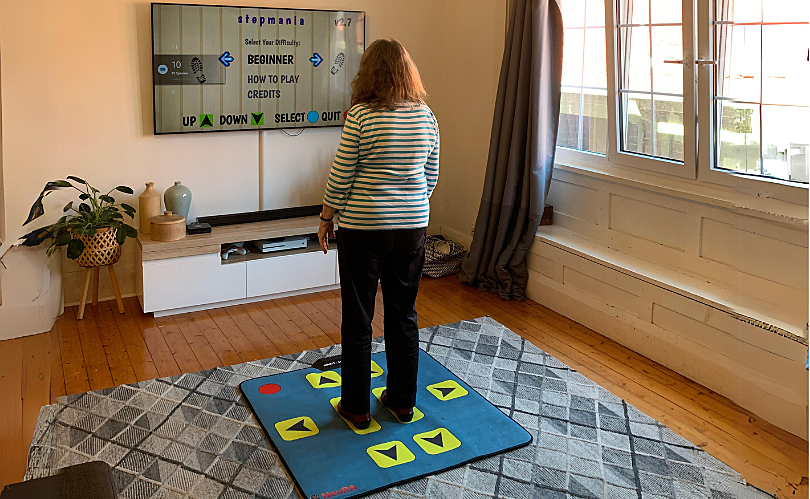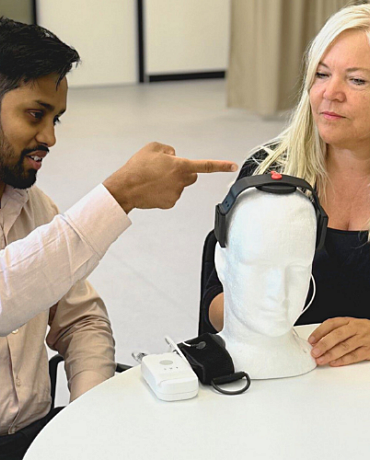- At-home exercise games (exergames) have been proven to be effective in preventing falls in individuals over 65, according to a large trial by NeuRA researchers.
- Scalable prevention strategies are required to address falls, with one in three people over 65 experiencing a fall every year.
- Participants involved in smart±step, an exercise gaming system developed at NeuRA, for 120 minutes weekly showed significantly fewer falls compared to a control group over 12 months.
- The enjoyable nature of gamified exercises ensures enhanced engagement, reducing the risk of falls and potentially also cognitive decline associated with ageing.
- The smart±step system is designed for intuitive, safe and self-guided use at home. Those interested in purchasing can join a waitlist via email hidden; JavaScript is required.
A large randomised control trial conducted by Neuroscience Research Australia researchers found that at-home gamified step exercises were effective at preventing falls in people over the age of 65, reducing falls by 26 per cent when compared to a control group.
One in three people over the age of 65 living in the community will experience a fall every year. Falls are a significant public health issue, contributing to mobility-related disability and loss of independence, and are the second leading cause of unintentional injury deaths worldwide.
With a steadily ageing population, scalable and effective fall prevention strategies are needed to address the growing impact of falls in the community.
“Regular balance challenging exercise is effective at preventing falls, so we tried to make exercise fun and easy to do,” says Dr Daina Sturnieks, lead author of the study and Senior Research Scientist at NeuRA and UNSW Sydney.
“It was really encouraging to see that smart±step, an exergaming console that anyone can enjoy at home completely unassisted from a therapist, brought a benefit to older people by preventing falls.”
About the study
People who participated in Dr Sturnieks’ study were living in the community, over the age of 65. They were asked to do smart±step exercise games for 120 minutes per week over the course of 12 months. They reported their falls over this period and this data was compared to a control group, who only received a public health pamphlet about preventing falls.
Over a 12 month period, participants who used smart±step showed 26 per cent fewer falls. The results of the trial were published in Nature Medicine.
Why gamified exercise for preventing falls?
The best evidence for fall prevention in the community is balance challenging exercise, says Dr Sturnieks.
“We’ve known for a long time that, if done correctly and consistently, balance challenging exercises can prevent falls. But the problem is that often people don’t keep up with their exercises because they can get boring very quickly,” she says.
This led Dr Sturnieks and the team at the Falls, Balance and Injury Research Centre at NeuRA to explore the idea of gamifying the balance exercises.
“People get addicted to games because they are fun and they become motivated to beat their high score and just get lost in the game,” says Dr Sturnieks.
smart±step is connected to a television screen and once a game of choice is selected it requires the person to step on target panels on a step mat, just like one would with a game controller.
Brain training added benefit
With smart±step exergames, there’s not only the physical exercise benefits. People are also undertaking cognitive or rather brain training, which is easily incorporated into these games.
“These exergames require people to think quickly, unlike traditional exercise programs where you just go through the movements,” says Dr Sturnieks.
The smart±step exergames involve stepping on a mat, which acts as a controller. The exergames vary in content: from collecting treasures to stomping on moving cockroaches or avoiding obstacles. Overall, the games require quick movement and thinking to keep up.
“Exergames are like a two-in-one: you get physical benefits but also you are keeping yourself cognitively challenged, which is good for the brain and healthy ageing. Plus, it’s fun!”
Additional resources
To be added to a waitlist to purchase smart±step, please email email hidden; JavaScript is required.





